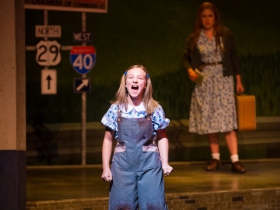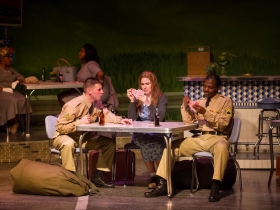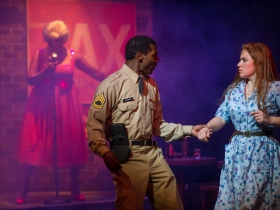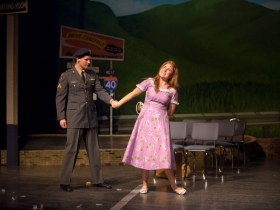Thoroughly Modern Musical
Skylight’s ‘Violet’ is energetic version of Broadway show with all the modern music idioms.
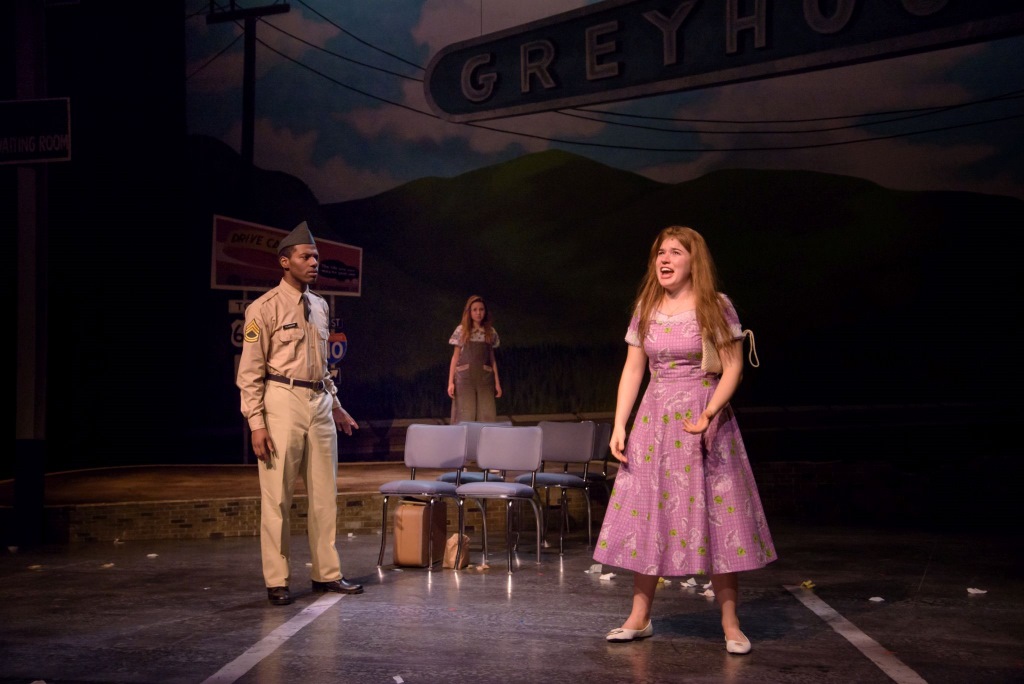
Lamar Jefferson (Flick), Ella Rose Kleefisch (young Violet) and Allie Babich (Violet) in Skylight Music Theatre’s Violet. Photo by Mark Frohna.
Here’s an accomplished look inside the vocal demands, interior character themes — and long gestation — that underpin so many of today’s top musicals.
The vehicle is Violet, tested in 1994, a brief off-Broadway sensation in 1997, then an honored Broadway attraction in 2014. That history is much like the musical – a demanding journey through all modern musical idioms within a dramatic framework that audiences took time to embrace.
In the Skylight Music Theatre production running through Oct. 16, an ensemble of great fluidity pirouettes around the luminescent performance of Allie Babich as Violet.
Composer Jeanine Tesori (also responsible for the current Tony winning Fun Home) represents the new heights musicals are demanding in virtuosity, fidelity to the story and high-flown crescendo flourishes — none in the service of that “American Idol” stereotype, but in the service of the plot and its characters.
The worry in any production of this material (one act or two acts as here) is basic. How to draw the audience into “The Ugliest Pilgrim,” the story and theme by Doris Betts that led to Brian Crawley’s book and lyrics.
The story takes place in the 1960s. Disgusted by her scarred face, disfigured in a childhood accident, the angry Violet blames her deceased father even as she loves him (he reappears at key moments in the form of Skylight familiar Jeff Schaetzke). She is determined to find a healer to finally look like the women she idolizes in Hollywood magazines – remember what a great sway popular images hold over American longings?
So she takes the Greyhound from North Carolina, confidently putting her fate and faith in the hands of another familiar celebrity attraction — a popular Tulsa televangelist.
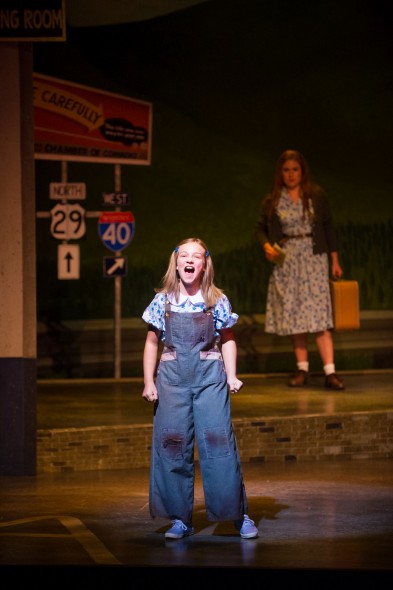
Kylee Hennes (Young Violet), Allie Babich (Violet) in Skylight Music Theatre’s Violet. Photo by Mark Frohna.
Playing off her in perfectly coached imitation of manner, voice and aspirations – amplifying the grown Violet’s memories and dreams — is the child Violet, double cast in this production. My night featured Oconomowoc 8th grader Ella Rose Kleefisch in the role and I trust that Kylee Hennes blends just as scrupulously on her nights.
The patrons never see any scar. That’s the theatrical conceit. It does more than spare the audience and free the makeup artists from nightly agony. It deals with how visibility shapes our lives, how appearance becomes more judgmental than we like to think. We are free to look inside Violet while others onstage are defined by their reaction to her face.
Make no mistake. Violet is no convent flower. Out of self-loathing and toughened by rejection and the desires of the bright young woman inside, she can verbally give as good as she gets and is hungry for male attention.
On the bus she meets two soldiers – one black who knows about scars in the way people look at you, the other an unstoppable ladies’ man. Some twists of the heart result.
It may seem surprising how affecting within the story the musical numbers and cross-stage harmonies are. While some have catchy phrases (“On My Way” and “Luck of the Draw”) few of the songs even try for the sort of melodic passages the audience hums on the way out, which was the old-fashioned measure of a musical’s strength.
Here every note and contemporary recitative advance Crawley’s words and the sense of rapid movement through many places on the road. This show is a traveling man of Southern flavors – starting with a folk song sound, then a Memphis Elvis nightclub sound, then lyrical love interludes, then a preacher’s choir bristling with invented spirituals and long-held high notes that would put Patti LaBelle to shame.
There is a price for this variety of styles built around a core motif while also probing for psychological progression and meaning. There’s tons of behavior (determination, sarcasm, sexual hunger, romance, anger, desperation and realization) that has to be compressed and still believable. The characters’ internal maneuvers have not been worked out as well as the music signals. It’s more like keeping time with a song than getting inside it. That creates an audience more watchful and admiring than fully engaged, understanding what is going on but not quite buying it.
Babich as Violet does all she can to counter that, as if following a mental model she is determined to make her own. She has a versatile voice with a strong center that can sit inside country riffs and ballads alike. She’s trying for meaning over volume and thus links the shifting tides of her character together for much of the way, a far more natural changing of moods.
On a functional set anchored as a Greyhound station, the cast does triple duty playing secondary roles, leaping in and out of chorales and solos — and Violet’s life. Director Sheri Williams Pannell clearly understands and tightly guides the proceedings, getting a crispness of delivery and even providing room, if the performers take it, to grow within the timing constraints of the music. Every character actually has space to develop.
When he doesn’t push the grief, Schaetzke has touching turns in the story’s underlying father-daughter motif. There is also Rick Pendzick wonderfully sweaty and self-centered as the evangelist; Raven Dockery shattering the backwall as a gospel overachiever; Samantha Sostarich as an annoying old lady and a flashy street hooker, and solid support from Robby McGhee, Ryan Stajmiger, and Cynthia Cobb.
Keeping a tight rein – and never covering up the singers — was a nimble eight-member pit orchestra led by Anne Van Deusen.
It’s a compelling telling of Violet that should impress audiences and make them want to see the lead newcomers in more Skylight roles. There are some continuity problems in this version. The two soldiers act like old sparring buddies though they have been staged as strangers meeting – in the South, in the Sixties, one black and one white. Violet’s final resolution and romantic involvement remain too pat for a modern musical that has set us up for a psychological payoff.
But I was touched often by the young Violet and the grown Violet as an echoing look inside the same main character.
Violet Gallery
Dominique Paul Noth served for decades as film and drama critic, later senior editor for features at the Milwaukee Journal. You’ll find his blog here and here.
Review
-
‘L’Appartement’ Is a Mind-Bending Comedy
 Mar 25th, 2024 by Dominique Paul Noth
Mar 25th, 2024 by Dominique Paul Noth
-
Highlands Café Is Easy to Love
 Mar 15th, 2024 by Cari Taylor-Carlson
Mar 15th, 2024 by Cari Taylor-Carlson
-
‘The Mountaintop’ Offers Very Human Martin Luther King Jr.
 Mar 11th, 2024 by Dominique Paul Noth
Mar 11th, 2024 by Dominique Paul Noth
Theater
-
‘L’Appartement’ Is a Mind-Bending Comedy
 Mar 25th, 2024 by Dominique Paul Noth
Mar 25th, 2024 by Dominique Paul Noth
-
‘The Mountaintop’ Offers Very Human Martin Luther King Jr.
 Mar 11th, 2024 by Dominique Paul Noth
Mar 11th, 2024 by Dominique Paul Noth
-
‘The Chosen’ Is Subtly Powerful Drama
 Mar 10th, 2024 by Dominique Paul Noth
Mar 10th, 2024 by Dominique Paul Noth

